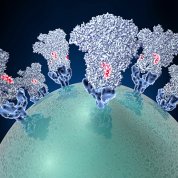
On the Cover
Coronavirus spike protein structure. Coronaviruses are enveloped viruses responsible for 30 percent of mild respiratory infections and atypical deadly pneumonia in humans worldwide. These pneumonia include those caused by infections with SARS-CoV and MERS-CoV. The coronavirus spike glycoprotein mediates virus entry into cells and represents an important therapeutic target. The illustration shows a viral membrane decorated with spike glycoproteins; highlighted in red is a potential neutralization site, which is a protein sequence that might be used as a target for vaccines to combat coronaviruses.
DAVID VEESLER, UNIVERSITY OF WASHINGTON





